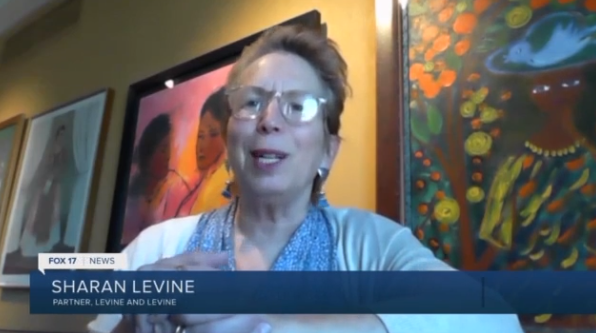 After the recent announcements from the Centers for Disease Control and Prevention, Michigan Governor Gretchen Whitmer and the Michigan Department of Health and Human Services about lifted mask guidelines for fully vaccinated people, Levine & Levine Attorneys at Law Partner Sharan Levine was thrilled.
After the recent announcements from the Centers for Disease Control and Prevention, Michigan Governor Gretchen Whitmer and the Michigan Department of Health and Human Services about lifted mask guidelines for fully vaccinated people, Levine & Levine Attorneys at Law Partner Sharan Levine was thrilled.
“I think this news feels like a holiday, and we should all have a celebration. It’s been a very long time coming,” she told FOX 17 during an interview on Friday, May 14. “I think that it will have a big impact for businesses with the hope that they can return to some sense of normalcy.”
Levine said the pandemic has been “extraordinarily difficult” for her clients. She represents several local businesses and has been helping them stay afloat throughout all the state-mandated restrictions and temporary pauses. Some survived. Others didn’t.
Nevertheless, she recommended looking at the new rules closely.
“I think we have to be really cautious about what the CDC said and what Governor Whitmer just said. There’s some nuances to this. If you’re vaccinated, you’re more liberated,” Levine said during a Zoom video interview with FOX 17. “The point is that people need to be mindful that both of these rulings came down, if you will, these new (regulations), but the exception is for businesses, local municipalities, and tribal reservations. They are able to make their own rules and set their own guidelines.”
MDHHS stated in a press release that the state is lifting the mask mandate to keep “Michigan in alignment with CDC guidance.” The new guidelines went into effect on Saturday, May 15.
However, Levine believes that restaurants and businesses may still require masks for a long time after the mandate is lifted.
WMU Cooley Law Professor Mark Dotson agreed.
“Some people have dress codes. You can’t enter unless you got on shoes. No flip-flops, no bare feet, no whatever,” said Dotson. “They can impose whatever requirement they want to for people that enter their business. I would imagine most of them want to take advantage of the CDC guidelines and recommendations.”
He added that if restaurants and businesses choose not to require a mask mandate, then he said it's best they implement some social distancing rules and have capacity limits, to ultimately ensure everyone's safety and to prevent any potential lawsuits from happening.
“There’s two potential claims that I see: one is a claim brought by a patron based on getting the virus and a claim brought by a worker seeking worker's compensation benefits because they were contaminated while on the job,” Dotson said. “You still have proof issues as to whether they actually contracted the virus or were exposed to it. That’s all to be worked out by the potential claimants. And, just in case this is looming, there is no right to enter a business without a mask if indeed the business requires a mask be worn.”
Levine agreed, saying that lawsuits “won’t hold water” in court.
She suggested that going forward, restaurants and businesses should implement rules and guidelines that are reflective of their own needs and their employees’ needs, to make sure everyone is safe in their establishments.
“There are some employees in businesses who are very concerned about their health and well-being, people who are working in business places who have sensitive health issues or have autoimmune diseases,” Levine said. “It’s going to be up to these businesses to say this is our preference and the willingness of those clients and customers to comply.”
Read the entire FOX 17 story, here.

